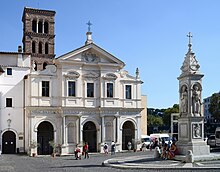San Bartolomeo all'Isola
| Basilica of St. Bartholomew on the Island Basilica di San Bartolomeo all'Isola Basilica S. Bartholomaei in Insula |
|
|---|---|

Façade of San Bartolomeo all'Isola on the Tiber Island
|
|
| Basic information | |
| Location |
|
| Geographic coordinates | 41°53′25″N 12°28′42″E / 41.89028°N 12.47833°ECoordinates: 41°53′25″N 12°28′42″E / 41.89028°N 12.47833°E |
| Affiliation | Roman Catholic |
| Rite | Oriental rite |
| Country | Italy |
| Year consecrated | 10th Century |
| Ecclesiastical or organizational status | Minor basilica, Rectory church |
| Leadership | Cardinal Blase Joseph Cupich |
| Website | www |
| Architectural type | Church |
| Specifications | |
| Direction of façade | Northwest |
| Length | 45 metres (148 ft) |
| Width | 22 metres (72 ft) |
| Width (nave) | 12 metres (39 ft) |
The Basilica of St. Bartholomew on the Island (Italian: Basilica di San Bartolomeo all'Isola , Latin: Basilica S. Bartholomaei in Insula) is a titular minor basilica, located in Rome, Italy. It was founded at the end of the 10th century by Otto III, Holy Roman Emperor. It contains the relics of St. Bartholomew the Apostle, and is located on Tiber Island, on the site of the former temple of Aesculapius, which had cleansed the island of its former ill-repute among the Romans and established its reputation as a hospital, continued under Christian auspices today.
Its Cardinal priest has been Cardinal Blase Cupich since 19 November 2016.
In Roman times, the Temple of Aesculapius stood on the site of the modern church. The entire Isola Tiberina had actually been covered in marble in an effort to make the island look like a ship. The prow can still be seen today.
Emperor Otto built this church, which was initially dedicated to his friend Adalbert of Prague. It was renovated by Pope Paschal II in 1113 and again in 1180, after its rededication upon the arrival of the relics of the apostle Bartholomew. The relics were sent to Rome from Benevento, where they had arrived from Armenia in 809. The relics are located within an ancient Roman porphyry bathtub with lions' heads, under the main altar. The marble wellhead bears the figures of the Savior, Adalbert and Bartholomew and Otto III.
...
Wikipedia
